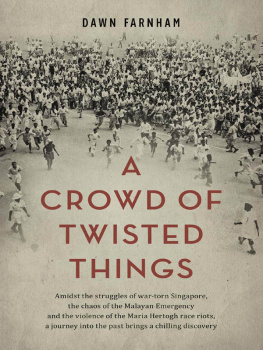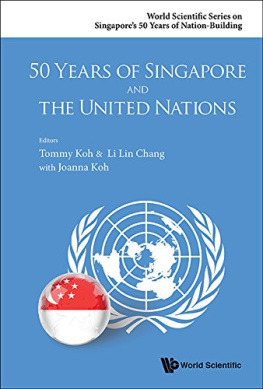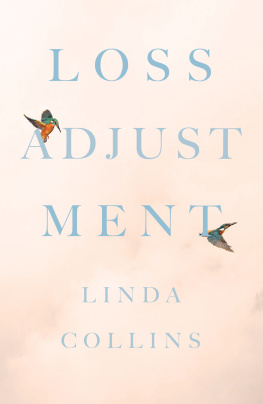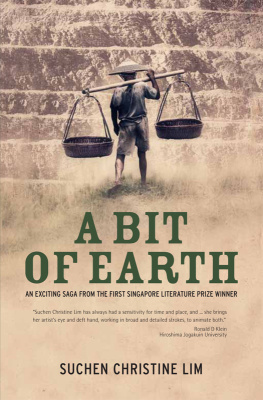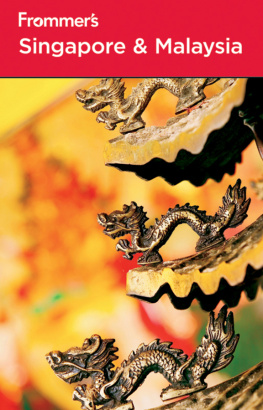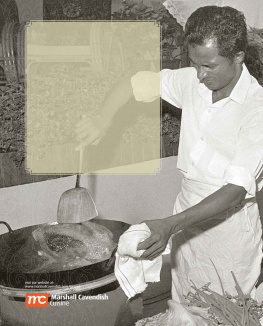A CROWD
OF TWISTED
THINGS
D AWN F ARNHAM

For my husband Roger Crabb
Journalist and Chief Correspondent
The Gloucestershire Echo, England
Agence France-Presse: Paris
Reuters: Paris, Beijing, Hong Kong, Seoul, Tokyo,
London and Singapore.
Newsmen are like the noble elephants. They travel in herds and think alike. They dont trust the jackals and hyenas who try to trick them in their never-ending pursuit of the green grass of truth. They have big ears and never forget.
The memory throws up high and dry
A crowd of twisted things;
A twisted branch upon the beach
Eaten smooth, and polished
As if the world gave up
The secret of its skeleton,
Stiff and white.
Rhapsody on a Windy Night
T.S. Eliot
Contents
Prologue
The small beat in Annies temple quivered like a captive moth. The gold carriage clock on the bedside table ticked. The banded chik chak looked down, splay-footed, from the wall and tut-tutted three times, its long tail curled into a question mark, its gibbous eyes immobile.
Perhaps it was this, the croaky call of the inquiring gecko, which found an echo in the still quick centre of her brain. Perhaps it was the sting of the mosquito or the sudden song of a night bird or the movement of the sudden breeze against her skin, but her body jerked into consciousness and the delicate skin of her hand splashed blood as it knifed into the corner of the bedside table. Her throat yawned in a silent scream, her body kicked. Not now, it said to the innermost workings of her cells, not yet. She drank in a great draught of warm air, roaring like a violent wind over her gullet. Her skin erupted in sweat, her heart hammered. The air rushed out of her lungs and she sucked again.
The tick of the clock sounded in the silence, beating the seconds away. Little by little, the turmoil and spasms of nerves and blood receded. The bellows calmed, the heart knock faded. Her eyes opened.
She was on her bed, in her room. The long low light was in that moment of tropical daylight when the sky fills with the last blush of the sun, the heavy heat leaves the day, the big hawks make shadow circles in the fading sky and flocks of swifts whirl into the fading treetops with a thunderous chirping. She took a shuddering breath and put a palm to her slippery brow.
The hush of the house lent the jungle an orchestral clarity. Against a choir of tinny crickets came the conversations of the frogs wallowing in the muddy drains and the throaty rasping booms of the bullfrogs. Above this she caught the trill of the nightjar, the twilight bird, the insistent whirr of its spinning-wheel notes giving prelude to the night. Its image lay behind her lashes, its long-tailed shadowy form moth-like against the dusky sky.
The Malays call it the graveyard bird, for its love of the undisturbed realms of the dead. This thought roused her from torpor. Sitting up was a struggle but being upright settled the whirling in her brain, and she put her legs to the floor with decision as the fingers of darkness snuffed out the day. Her hand ached and she looked down at the dripping blood. She opened the bedside drawer and took up a white handkerchief and wrapped it around the seeping wound. The cloth flushed red like a rose opening its petals. She hardly noticed the scattering of white pills on the bottom of the drawer.
The house was silent. That was puzzling. At this hour the boy filled her bath, and the distant sounds of clatter and chatter trickled in from the kitchen in the garden. Ronald usually had drinks around six. Her brow furrowed and she pressed her fingers to the aching, insistent pulse in her temples. No. Wait. That was before. Before the Japs had begun the shelling. She looked up, as if a silver missile might come crashing through the ceiling. Perhaps the silence meant it was over.
Ronald, when he spoke to her at all, told her impatiently that there was nothing to worry about. Dwarfs, he blustered, myopic dwarfs. Perhaps he was right. The dwarfs had given up.
She put out a hand to her bedside table to steady herself and got to her feet. An insect whined, and she slapped at her arm. The pain in her hand jangled. Why were the paraffin lamps not lit?
Ah Lin, she called, but her voice rasped weakly and echoed faintly along the corridors of the old house without answer.
She groped on the table and found the candlestick and matches. A bomb had fractured the Tanglin substation and electricity was but a distant memory. The memsahibs had all come like a flock of waddling geese, to look at the lumps of concrete and tangled metal, and at the splintered, tipping trees, their roots standing out of the ground like long gnarled fingers. The old Malay guard had been killed and his family had wailed piteously as theyd gathered up his flung remains. Annie had seen dead bodies before, in Ipoh, but none as splintered as this; shed felt a shameful, gory curiosity.
Annie understood nothing of the whys and wherefores of this war. In Ipoh, the half-hidden cloistered life of the convent meant the outside world could, if you chose to do so, be ignored. Here, in Singapore, it was as if Tanglin was surrounded by the same high walls. The town was bombed to rubble but these leafy suburbs were virtually unscathed. Until that moment, it was possible, with a will, for the women to ignore this incomprehensible conflict. Now, there was blood on the village green and the geese were honking.
Yet few of the families left. It wasnt the right thing to do, the white thing to do. It sent the wrong message to the natives. Thats how it was stated: the wrong message to the natives.
Annie, who knew she was at least half a native of somewhere not white, had few acquaintances and no friends amongst the chattering British mems and cared little for what they did. Some of the women and children, shed heard, had rushed off down to the port when the news had come that the Japs had crossed the Straits, but Ronald had set his face against departure, offered himself to some volunteer military outfit, and so here they were. Annie had no idea where they would, in any case, have departed to. Ronald, as far as she knew, had no family at all.
The match fizzed and she put it unsteadily to the wick and waited until it caught. A feeble halo of light glowed, just enough to see her own feet, bare and pale, shuffling through the black soot. The candle flickered in the breeze that had sprung up as the heat had melted away from the day, and she put her aching hand around the flame in protection, inhaling, as she walked, the smell of the acrid smoke from the burning oil at Tanjong Pagar Harbour.
The strains of the notes of a piano floated to her ear. Ronald was playing Begin the Beguine. He had suddenly returned yesterday afternoon, filthy, and had retired, without a word, to his room.
She cared nothing for Ronald. They had become married simply because he, at fifty-six years old, had seen her at a Christmas concert given by the convent, met the Mother Superior and asked for her hand. That a girl like Annie, without parents or background, should receive a proposal of marriage from a white man of considerable fortune was deemed miraculous. She had needed no persuasion. Ronald and his money were her escape route, and she had jumped at it.
She stopped at the door of her daughters room. Where was the ayah? She held the candle up to the cot. It was empty. Suzy must be with Ronald. Suzy was the only thing in the whole world that Annie loved.
Her feet padded along the sooty boards, towards the glow of light from the living room. Ronald was hunched over the piano, his thinning hair revealing his shiny scalp, his hands moving gracefully along the keys.

